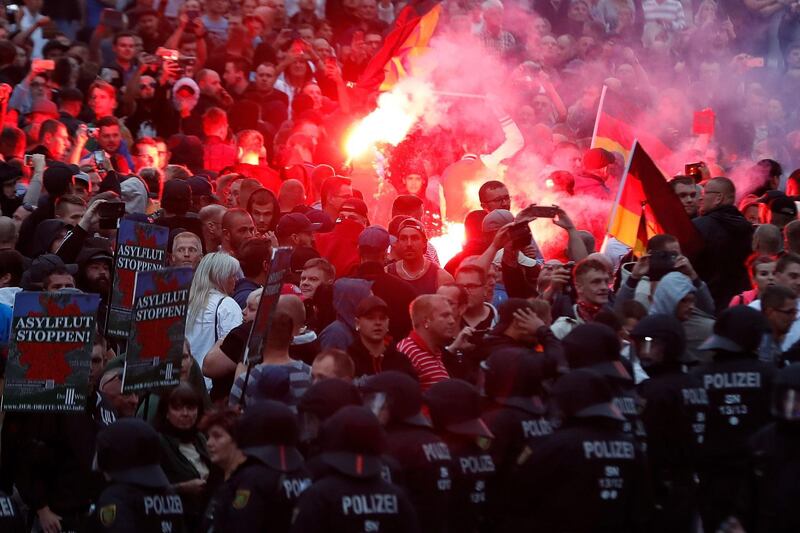Germany will not tolerate “vigilante justice,” Chancellor Angela Merkel warned as a murder allegedly committed by migrants sparked a wave of racist mob-attacks in the east of the country.
“There is no place in Germany for vigilante justice, for groups who want to spread hatred on the streets, for intolerance and for extremism,” Ms Merkel declared in response to ongoing clashes. “That has no place in our cities and we, as the German government, condemn it in the strongest terms.”
Mrs Merkel's comments are the latest attempt to restore calm in the city of Chemnitz after the murder of a 35-year-old man on Sunday led around 800 far-right supporters to conduct assaults on people believed to be immigrants.
Footage on social media showed far-right protesters chasing an Arab-looking young man and chanting slogans including “We are the people.”
Placards reading “Defend Europe” also contained the image of an automatic rifle.
Police said extremists on Sunday attacked an 18-year-old Afghan and his German female companion, 15. An 18-year-old Syrian man was grabbed and assaulted while a 30-year-old Bulgarian man was subjected to threats. No one was seriously injured, police said.
______________________
German foreign minister brands Trump’s EU policy ‘irritating’
Putin pushes Merkel for Syrian refugee return even as many go hungry
______________________
The mobs were instigated by far-right groups on social media following Sunday’s stabbing incident, allegedly committed by a Syrian and an Iraqi. Police arrested Monday a Syrian man, 23, and an Iraqi man, 22, on suspicion they had killed the German man, 35, with multiple stab wounds as a result of an altercation on the sidelines of a street festival. Two other men aged 33 and 38 were hospitalised with severe injuries after the fight.
Police said that the investigation into the motives of the attack was ongoing. Flowers and a candle were laid down in central Chemnitz to mark the spot of the attack.
Unrest broke out again on Monday when over 1,000 left-wing protesters confronted far-right members brandishing the German flag and chanting slogans against “criminal foreigners.”
Saxony state interior minister Roland Woeller labelled the events as "a new dimension in the escalation" of simmering local tensions.
The mayor of Chemnitz, Barbara Ludwig, told local media that “the fact that people can agree to meet … run through town and threaten people is bad.”
However, Markus Frohnmaier, leader of the Alternative for Germany party, backed the mobs in a tweet, saying that “if the state is no longer able to protects its citizens, then people take to the streets and protect themselves.”
Ms Merkel stood firm against calls to turn refugees back from Germany’s borders, despite tensions between her and the interior minister could undermine the government’s stability.
Interior Minister Horst Seehofer, of the Christian Social Union (CSU) party, put forward a controversial “master plan” demanding that refugees who had already applied for asylum elsewhere be turned away.
Ms Merkel, who is in her fourth term a chancellor, is seen to be in a precarious position as sacking Mr Seehofer may mean the collapse of her government.
At the EU level, Ms Merkel faces an even wider standoff, with Italy’s populist government refusing to disembark refugee ships and France’s government calling for tougher protection of Europe’s external borders.
Italian Prime Minister Giuseppe Conte and French President Emmanuel Macron both supported the idea of asylum agencies on the other side of the Mediterranean and advocated for “profound reforms” of the EU’s Dublin regulation.
Merkel’s open-border policy – which allowed almost a million refugees to enter Germany in the summer of 2015 – is widely blamed for helping the right-wing, populist and anti-immigrant Alternative für Deutschland (AfD) into the Bundestag in elections last year.
Germany has seen a resurgence in far-right sentiment over the last few years, along with the rapid rise of the anti-immigration, anti-Islam Alternative for Germany (AfD).






